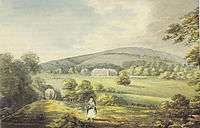Sir John Chichester, 4th Baronet
Sir John Chichester, 4th Baronet, of Raleigh (1689-2 Sep 1740) was MP for Barnstaple 1734 – 2 September 1740.[1] He was a Jacobite during the first few years of the reign of King George I (1714–1727).[2] The seat of the family was Youlston Park in the parish of Shirwell, Devon, but formerly until 1689 had been the manor of Raleigh in the parish of Pilton.
Origins
He was the eldest son and heir of Sir Arthur Chichester, 3rd Baronet, MP, by his wife Elizabeth Drewe, daughter of Thomas Drewe of The Grange, Broadhembury, Devon.[3]
Marriage
He married twice:
- Firstly to Anne Leigh (1695–1723), daughter and heiress of John Leigh (d.1718) of Apse, Newport, Isle of Wight. The marriage settlement dated 12 October 1715 is held by North Devon Record Office, summarised as follows:[4]
(1) Sir Arthur Chichester of Youlston, Bart., Elizabeth his wife, and his son and heir apparent, John Chichester, esq. (2) Anne Leigh, only daughter and heir of John Leigh, late of Newport, deceased. (3) John IV Courtenay (d.1724) of Molland, esq. (the father-in-law of John Chichester's sister Mary, married to George Courtenay (1701–1731)), William Bragg of Sadborough, Parkham esq., William Page of Fremington, esq., and Claver Morris of Wells, Doctor of Physic, trustees.
Recites that (2) covenants that, within one year of reaching the age of 21 years, she will convey to (3) all lands, etc., bequeathed to her by her father John Leigh, deceased (Manor of Apse, Newport, Isle of Wight[5]), (1) covenant to convey to (3) the manors of Bratton Fleming, Loxhore, Shirwell, Stoke Rivers, and Brendon; and also Youlston Barton, Youlston Park, Brendon Barton, Bratton Mills, Ash tenement, and Slowly tenement, in Braunton, Shirwell, Brendon, and Bratton Fleming parishes; and also all messuages of (1) in Pilton and Barnstaple, and also the advowsons of Brendon, Shirwell, and Georgeham; and also a chief rent of £14. 18s. 6d. from the Borough of Barnstaple.
They had the following children:[6]
- Sir John Chichester, 5th Baronet (1721–1784), Sheriff of Devon in 1753.
- Rev. William Chichester (1722–1770), 2nd son, Rector of Georgeham and Shirwell.[7] Married Mary Bellarmine, daughter of John Bellarmine (or Ballyman) of Hart, Heanton Punchardon, Devon. His grandson was Sir Arthur Chichester, 7th Baronet (1790–1842), who was the heir of his cousin John Chichester, 6th Baronet (d.1808) who died unmarried without issue.
- Katherine Chichester, married in 1740 to George III Musgrave (d. 1742), of Nettlecombe and Combe Sydenham, both in Somerset, whose mural monument exists in Stogumber Church.
- Anne Chichester (b.1719), married William Sanford of Nynehead, Somerset
- Florence Chichester, married Rev. John Sanford, Rector of Moniton, Somerset
- Charlotte Chichester (1723–1748)

- Secondly in 1733, to Frances Quicke, daughter of Andrew Quicke (1666–1736) of Newton St. Cyres, Devon, and widow of Francis Hall (d.1728) of West Sandford, Crediton.[8][9][10] A monument to Francis Hall (d.1728) exists in Newton St Cyres Church. West Sandford was a very large mansion about 2 1/2 miles NW of Crediton, near the ancient Chichester estate of Ruxford, of which a watercolour painting was made in 1797 by the Devon topographer Rev. John Swete. The latter wrote of West Sandford in his Travel Journal in 1797 as follows: "The appearance of this house, built with brick and decorated with white mouldings, is of great respectability. Its contiguous gardens with high walls and large gates and the groves that shelter it on the NE speak it to have been the residence of some person of consequence who had a relish for things of former days and was too advanced in years to adopt the improvements of modern taste. It was long the property and abode of Lady Chichester and by her decease a few years ago became a possession of Sir John Chichester of Youlston, Bart. Beheld in its two fronts from a rising point of the public road it had such extent of building as to possess a degree of magnificence; nor has it less to recommend itself for its situation, having spread out before its windows some of the richest pasture ground in the county. What ingredients of the picturesque, taking advantage of the road as a foreground, may enter into the composition of the scenery, may be collected from the following sketch".[11] This large house appears to have disappeared with little trace, no mention of it being made by Pevsner or Hoskins, the leading modern authorities on such matters.
Sources
- Eveline Cruickshanks, biography of Sir John Chichester, 4th Baronet, published in History of Parliament: House of Commons 1715–1754, ed. R. Sedgwick, 1970
- Vivian, Lt.Col. J.L., The Visitations of the County of Devon: Comprising the Haralds' Visitations of 1531, 1564 & 1620, Exeter, 1895.
- Archives of the Chichester Family of Devon, North Devon Record Office, ref:48/25, covering dates 1450–1874
References
- ↑ Cruickshanks
- ↑ Cruickshanks
- ↑ Vivian, Visitations of Devon, 1895, p.174
- ↑ North Devon Record Office 48/25/22/4 12 October 1715
- ↑ See 48/25/22/3, Will of John Leigh proved 1718
- ↑ Vivian, p.175
- ↑ Vivian, p.175
- ↑ Burke's Genealogical & Heraldic History of the Landed Gentry of GB & Ireland (Quicke of Newton St Cyres), where Francis Hall is stated as of "West Sandford"
- ↑ Vivian, Heraldic Visitations of Devon, 1895, pp.854–5, Quicke of Newton St Cyres
- ↑ Cruickshanks
- ↑ Gray, Todd & Rowe, Margery (Eds.), Travels in Georgian Devon: The Illustrated Journals of The Reverend John Swete, 1789–1800, Vol.3, Tiverton, 1999, p.120